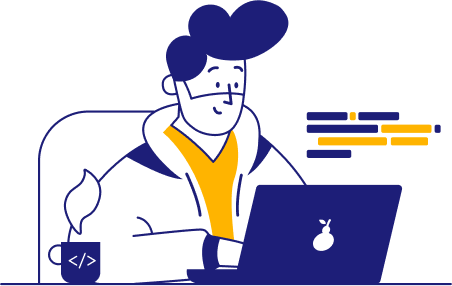Some jobs are really easy to apply for—the company has a dedicated application system and all you have to do is fill in the fields with your personal details and attach your resume and cover letter. Dream come true!
And then, there are companies that don’t have a special system, and they don’t use a third-party application system, either. Instead, they want you to send them your job application via email.
If you don’t know what to write in a job application email, don’t worry. It’s not obvious, but we have the answers! So sit back, run your resume through a resume checker to prepare, or create one from scratch with a resume builder, and follow this guide to craft the perfect email.
What Is a Job Application Email and Why Do You Need One?

A job application email is an alternative way to send your application to a company if it does not use an automated application system. There are several reasons why a company might not have a dedicated system for applications—perhaps the company is too small, or perhaps you’re applying for a job without an official listing.
Whatever the reason, the only difference between a job application email and any other type of application is the method you’re using to send it. Its purpose, like any other type of application, is to demonstrate your interest in the job and highlight your skill set and qualifications.
It also serves as your initial introduction to potential employers, forming the foundation for their first impression of you as a candidate. This means it needs to be as well-crafted as possible—no mistakes, irrelevant rambling, unprofessional language, or emojis—nothing you wouldn’t put in a normal job application.
If you’re unsure about what you need to do, this article will help. We’ll go over everything you need to do to prepare and write your job application email, and we have some handy examples to share, too.
Preparing Your Job Application Email

Crafting a compelling job application email requires careful preparation and research—just like any other application. Before you write it up and press “send,” you need to gather essential information on the company and the position and prepare the required documents.
In this section, we’ll walk you through each step of the process to ensure you’re ready to start writing.

Gathering information
Research is the cornerstone of any successful job application—the more time you take to learn about the employer, the more effectively you’ll be able to grab the employer’s attention. Start by going through the company’s official website, where you should find information on its history, goals, culture, and greatest achievements.
If you’re applying to a large company, you can even search for blogs and videos of people sharing their application and interview experiences. It might give you some insight into the employer’s processes and what they value in an application.
You also need to thoroughly read through the job description so you can adjust your resume outline to match it. For instance, make sure all of the software and tools they mention in the job description appear in your resume skills section.

Document preparation
The job description will also tell you what documents you need to attach to your email. The most common documents employers tend to ask for are your resume, cover letter, and portfolio samples.
Make sure the file formats match whatever the job description asks for, and if it doesn’t specify, use a format that anyone can easily open, like PDF. Tailoring each document to the job description will make your application stand out as much as possible.
This includes mirroring the skills and experience the employer requires, as well as updating your career objective to mention the company you’re applying to. If you’re not sure how to write a cover letter or resume, there are plenty of career-specific resources out there to help.

Setting up for success
Before you start writing, make sure all of these documents are ready to use. Proofread them for typos and mistakes, run a grammar check on your cover letter, and run your resume through a resume checker. Make sure all of your contact information is up-to-date, and if you have any links on your resume or cover letter, make sure they work.
If you have a friend on hand, you can also ask them to read through your documents to make sure you haven’t missed anything. You can also write up a quick checklist of things you want to mention in the email, ensuring that you cover all essential points and adhere to professional standards.
Crafting Your Job Application Email

This email will serve as the initial introduction to a prospective employer, making it essential to craft it with care and precision. From the subject line to the closing remarks, every element plays a crucial role in making a positive impression.
In this section, we’ll review all the key components of the application email and show you exactly what you need to do to get it right.

The subject line
The subject line of your job application email needs to focus on clarity—you need to make the reader understand that the email is a job application and let them know your name, as well as which position you’re applying for.
Avoid generic subject lines like “Job Application” because it doesn’t give the reader enough information—and if they notice this lack of clarity, it may lower their expectations for you as a candidate.
Instead, try formats such as “Application: Position Title, Your Name,” or “Application for Position Title: Your Name.” If you’re reaching out to a company that hasn’t posted an official listing for an open position, you can also try out subject lines like “Experienced (job role) interested in working at Company Name.”
A compelling subject line increases the likelihood that your email will be opened and read sooner rather than later. It will make the reader think your application could be a good one.

The email body
Always begin your email with a professional salutation, addressing the hiring manager by name if possible. You might be able to find this information on the company website or on LinkedIn.
In the opening line, it’s good to start by expressing your enthusiasm for the opportunity and briefly mention how you learned about the position—since you’re sending the application by email, it’s harder for the company to guess this information.
If you’ve been referred by someone within the company, it’s best to mention this as early as possible, too. Next, you need to jump right into your qualifications, skills, and experiences. Remember, you will be attaching your resume and a cover letter, so this only needs to be a concise overview.
The purpose of mentioning your qualifications in the email is to convince the reader to open your resume and read it, not to make opening your resume pointless. Read through the job description again and pinpoint the most important skills and experiences to mention. You can end by letting the reader know that your full resume, a cover letter, and a portfolio are attached to the email.
Conclude the main body of the email by circling back to your enthusiasm for the role and the value you think you can bring to the company.

The email close
To end the email, express gratitude to the hiring manager for considering your application and invite them to contact you if they need any more information. For the closing salutation, the usual “Sincerely,” or “Best regards,” will work just fine.
You can also add an email signature for a professional touch—this will include your full name, contact information, and any relevant social media profiles.

Include relevant attachments
A job application email without its attachments would be quite useless, so you need to make absolutely sure that everything is attached correctly. Double-check that all the files are properly named and formatted for easy access. If you edited a previous cover letter, worked off a resume example, or started with a resume template, make sure the file name doesn’t give this away!
It can also be a good idea to add a note to the bottom of the email that lists the attached documents so the reader knows they have everything they’re meant to have. This way, if you did make a mistake, the hiring manager would be able to contact you about it.
Job Application Email Examples

As with most things, the most effective way to learn how to write a job application email is to look at examples. It teaches you what you need to aim for, and shows you multiple versions that cater to different situations. Here, we have three job application email examples that cover entry-level, mid-level, and experienced candidates.

Example emails
[Subject line] Application: Software Engineer, Vidya Singh
Dear Ms. Chase,
I hope this email finds you well. My name is Vidya Singh, and I am writing to express my interest in the software engineering role at Meta, as advertised on your careers page.
As a recent graduate with a Bachelor’s degree in computer science, I am eager to bring my passion for technology and problem-solving skills to the innovative projects at Meta.
Throughout my academic journey, I have gained hands-on experience in various programming languages, including Java, Python, and C++, through coursework and personal projects. I am particularly drawn to Meta’s mission to connect people and build communities, and I am excited about the opportunity to contribute to such impactful initiatives.
During an internship at Netflix, I had the opportunity to work on a team developing a mobile application using React Native. This experience not only honed my technical skills but also taught me the importance of collaboration and communication in a fast-paced environment. I am confident that my adaptability and eagerness to learn will enable me to thrive at Meta.
Attached, please find my resume, which provides further details about my academic background and experiences. I have also attached a cover letter,
Thank you for considering my application. I am looking forward to the possibility of contributing to the exciting projects at Meta and would welcome the opportunity to discuss how my skills align with the needs of your team.
Sincerely,
Vidya Singh
[email protected]
(650) 555-8273
[Subject line] Application: Product Manager Role: Celia Kowalewski
Dear Mr. Fine,
I am writing to express my interest in the product manager position at Airbnb. With three years of experience in product management, coupled with a deep passion for travel and hospitality, I am enthusiastic about the opportunity to contribute to Airbnb’s mission of creating unforgettable experiences for guests worldwide.
In my current role as a product manager at Airtable, I have led cross-functional teams in the development and launch of innovative products that have significantly improved user experience and driven revenue growth. One of my most notable achievements includes spearheading the redesign of our mobile app, which resulted in an 8% increase in user engagement within the first three months of launch.
I am particularly drawn to Airbnb’s commitment to fostering a sense of belonging and cultural exchange among its global community of hosts and guests. My background in product management, coupled with my personal passion for travel and exploration, uniquely positions me to contribute to Airbnb’s continued success in shaping the future of travel.
I have attached my resume and a cover letter, which provide further details about my professional background and accomplishments.
Thank you for considering my application. I am eager to explore how my skills and experiences align with the needs of your team and am available for an interview at your earliest convenience.
Sincerely,
Celia Kowalewski
[email protected]
(415) 555-9137
[Subject line] Application: Senior Accountant Role – Dimitris Fotakis
Dear Mr. Buckingham,
I am excited to submit my application for the senior accountant position at Axos Bank. With over 11 years of extensive experience in financial accounting and a proven track record of delivering accurate financial reporting and analysis, I am confident in my ability to make a significant impact within your esteemed organization.
Throughout my career, I have demonstrated a strong aptitude for financial management and compliance, coupled with meticulous attention to detail and a commitment to excellence. In my previous role as a senior accountant at Capital One, I was responsible for overseeing the preparation of financial statements, conducting thorough variance analysis, and implementing internal controls to ensure regulatory compliance.
I am particularly drawn to Axos Bank’s commitment to innovation and technology-driven solutions in the banking industry. I am eager to leverage my expertise in financial accounting and my proficiency with financial software systems to contribute to Axos Bank’s continued growth and success.
Attached is my resume, which provides a comprehensive overview of my professional background and accomplishments. I am also available to provide any additional information or references upon request.
Thank you for considering my application. I am enthusiastic about the opportunity to join Axos Bank and am looking forward to the possibility of contributing to your team.
Sincerely,
Dimitris Fotakis
[email protected]
(858) 555-4916

Follow-up email
Follow-up emails are a great way to demonstrate proactivity and professionalism. The start of the application process is often slow, so if a week or two passes without any response from the company, it’s a good idea to send a follow-up email.
It doesn’t need to repeat anything from your initial email, just be concise and professional. Start by expressing gratitude for the opportunity to apply and reiterating your continued interest in the position. Then, you can politely inquire about the status of your application and ask if there’s any additional information you can provide.
Job Application Email FAQs

Employers don’t always require cover letters, but it’s a good idea to send one anyway. If you’re sending your job application via email, you have two choices regarding cover letters. You can either include one within the body of the email or attach it as a separate document. The cover letter provides the perfect opportunity to introduce yourself, your skills, and your qualifications in more detail than your resume allows.
Job applications don’t need to be very long. You typically need an introductory paragraph, a couple of paragraphs on your skills and qualifications, and a couple of closing paragraphs to conclude, mention your attachments, and provide your contact details. In most cases, the total word count doesn’t need to exceed 250 words.
If you don’t receive a response within one to two weeks, it’s a good idea to send a follow-up email. Here, you can mention your continued interest in the job, and ask about the status of your application. It might feel a little needy, but it actually shows that you’re proactive and serious about the role.
The subject line should always be clear and specific, mentioning the position you’re applying for and your name. It should be instantly obvious that the email is a job application—because job applications are important and it will prompt them to click on it straight away. A simple format would be “Application: [Position title], [your name].
Don’t include overly personal details like your social security number, health issues, or family circumstances in a job application email. Also, skip attaching unnecessary files or photos, and avoid discussing negative experiences with past employers or colleagues. Keep the focus professional and relevant to the position.





